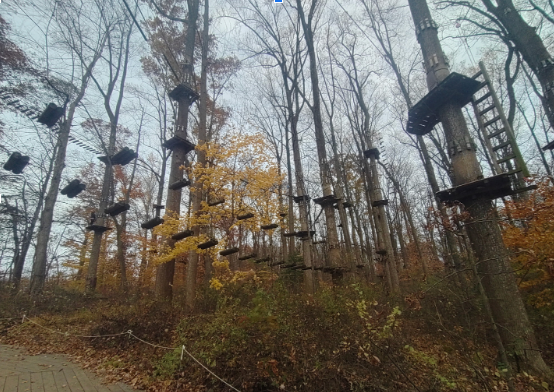DMV High Schoolers Are Working to Protect Student Journalists’ First Amendment
- Zoey Becker and Jessie Moss
- Jun 14, 2025
- 4 min read


For most high school seniors, May is a time to relax and bask in the excitement of upcoming graduations and college orientations. For James Libresco and Casey Donahue, it’s been something else entirely: a whirlwind of press tours and activism.
Libresco, 17, and Donahue, 18, are co-editors-in-chief of Theogony, Alexandria City High School’s student newspaper. Following the publication of several controversial stories regarding new Alexandria City Public Schools (ACPS) policies, ACPS introduced a new procedure earlier this school year requiring all Theogony articles to be subject to district approval. The new policy also required that members of the district’s public relations team be present at all Theogony interviews. Donahue found the policy particularly concerning, explaining: “Logistically, it sounds like a nightmare,” and “[Our principal] has no training in media ethics.”
ACPS is set to formally codify the new procedure by reinstating a long-unenforced policy that makes school principals “co-editors” of student publications. Libresco and Donahue, in collaboration with the Student Press Law Center (SPLC), drafted Voices Unbound, a counter-proposal which centers First Amendment protections.
School board officials have not adopted any of the twelve changes included in Voices Unbound.
Alexandria City School Board Chair Dr. Michelle Rief said in a statement that “neither the current nor the proposed policy includes language that censors students. The intention behind the proposed revision to Policy JP is to ensure that student publications are supported with adult oversight that promotes accuracy, ethical journalism and adherence to laws and policies that govern our school division regarding student privacy.”
Libresco and Donahue, however, argue that the administrative editorial power within the policy qualifies as censorship. The pair has been campaigning to pass a New Voices law in Virginia, which would provide additional protections for student journalists.
They’ve so far been unsuccessful. DC, alongside Virginia and 31 other states, does not have a New Voices law.
After several months of discussion with district officials but little progress in convincing them to adopt a New Voices law or Voices Unbound, Donahue and Libresco went public with their stories of alleged district censorship.
Libresco, recounting a phone call with someone involved in the policy, described saying, “‘We really don't want to go public, but we are prepared to do that, and we are going to get a massive response that you guys are not prepared for.’” As Libresco expected, the story has been widely received, with prominent journalists such as New York Times Chief White House Correspondent Peter Baker posting on X in support of Theogony’s efforts. Libresco added that “It's been so inspiring to see the community come together to support us and to show us that they care, to show the school that they care,” and described receiving letters of support from students across Virginia and as far away as Colorado.
Policies like ACPS’s have long sparked debate in the world of student journalism. Similar to Theogony, all Rookery articles are subject to administrative review and approval—a policy criticized by the 2024 editorial team in their farewell letters.
Principal Sylvia Isaac explained in a statement that “administration approaches editorial oversight of student publications with sensitivity…I do not have a desire to be or be listed as the editor of the Rookery or any other student-led media at SWWHS.
Isaac added, “my focus remains on balancing the efforts of our student reporters to learn by informing their peers via fact-based journalism with my duty to keep our school's learning environment free from substantial disruption.”
The legal issues surrounding school journalism policies are complex, having even reached the Supreme Court.
In Hazelwood School District v. Kuhlmeier, the Court ruled that school officials can exert editorial control over school-sponsored activities, such as student newspapers—unless the publication is established as a “public forum,” either by policy or consistent practice. In such cases, the Tinker v. Des Moines standard applies, which limits regulation to unprotected speech (such as libel or obscenity) or content that would cause a material and substantial disruption to the educational process.
Despite the legal gray area, legal professionals appear to side with Theogony. In addition to the SPLC, the Foundation for Individual Rights and Expression (FIRE), a premier First Amendment advocacy group, has expressed support for the students.
According to FIRE, Theogony should be protected under Tinker, not Hazelwood. In a letter to the chairwoman of the ACPS board, FIRE’s Program Officer for Campus Rights Advocacy, Dominic Colletti, wrote that for over 16 years, the district has allowed Theogony to publish without administrative review. Colletti added that district administrators have even referred to the paper as a “public forum” in private meetings with its staff.
The Hazelwood/Tinker binary is less clear at Walls. Principal Isaac said that “Our current guidance does not align squarely with either case, instead advising that school-based and district-level administrators are authorized to review the content within student publications.”
Despite both being graduating seniors, it’s “full steam ahead” for Libresco and Donahue. “If ACPS thinks they can wait us out,” Libresco said, “they're thinking wrong, because that's not what's going to happen…we're happy to pass off the torch, but we're not going anywhere.” Indeed, Libresco and Donahue haven’t wavered from their cause. “We need New Voices, and we need it now,” Libresco said, adding that “This really has the potential to kind of ignite a reckoning across our state and potentially even across the country.” Libresco further highlighted the importance of the movement in a moment where the free press is being challenged nationwide.
Ultimately, he urged other student journalists to follow in Theogony’s footsteps. “Push back against suppressive policies,” he said. “You have so much more power than you realize.”








